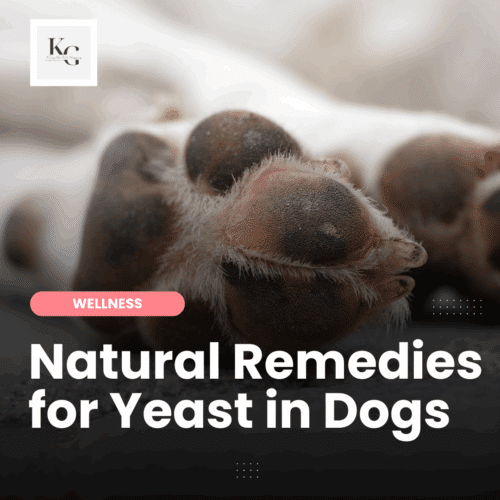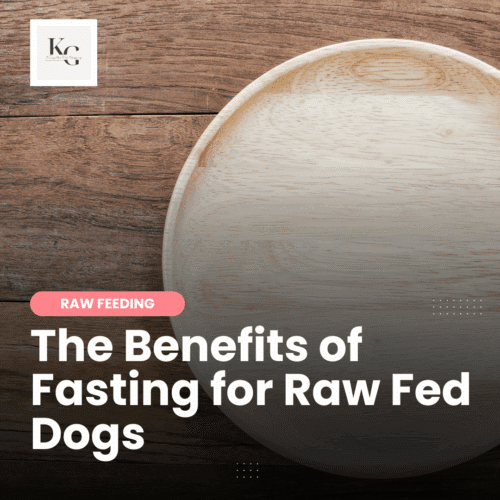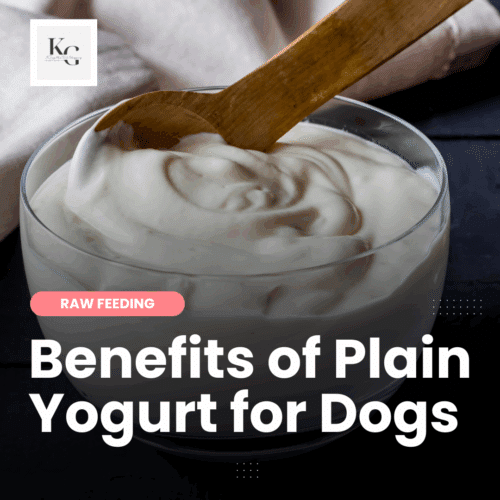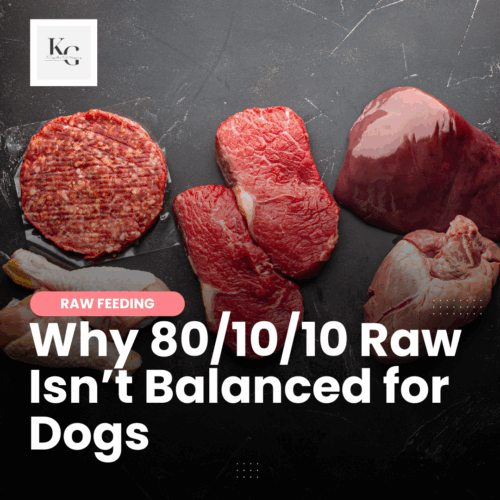Keep the Tail Wagging is supported by pet parents. I occasionally earn a commission (at no additional cost to you) when you click through an affiliate link to one of my favorite products. Thank you for your support. Read More
Does honey improve a dog's health, or is it just added sugar to the diet? Natural sugar, but sugar, never less? I've tried these products in the past, but not long enough to notice any changes in my dogs. However, I've added local raw honey and bee pollen to my tea or morning smoothies and saw a remarkable decrease in hay fever symptoms. So, if these natural foods can do this for me, what can they do for my dogs?
In this article, I'll explore the benefits of honey and bee pollen, how to find a quality product for my dogs, and the dosage recommendations for both supplements.
What is Raw Honey and Bee Pollen?
Local raw honey refers to honey produced by bees within a relatively close geographic region to where it is sold or consumed. It is typically minimally processed and unpasteurized to retain its natural enzymes, nutrients, and potential local pollen content.
Bee pollen is the small, granular substance that bees collect from flowers. It is highly nutritious and can be consumed as a dietary supplement due to its vitamins, minerals, proteins, and other beneficial compounds.
We typically consume honey as a sweetener, but it has several health benefits for humans and dogs. Bee pollen, on the other hand, is often consumed as a dietary supplement due to its nutritional profile.
Benefits of Local Raw Honey for Dogs
1 – Allergy relief: Similar to humans, some people believe that local raw honey can help alleviate seasonal allergies in dogs. The theory is that exposing dogs to small amounts of local pollen in honey may help build tolerance and reduce allergy symptoms. However, scientific evidence supporting this claim in dogs is limited.
2 – Soothing properties: Local raw honey can relieve minor throat irritation or coughing. It may help soothe the throat, reduce inflammation, and provide relief.
3 – Energy boost: Honey is a natural source of carbohydrates, which can provide a quick energy boost for active dogs or those needing additional energy. However, it's important to note that dogs don't have a biological need for carbohydrates in their diet, so feeding honey regularly isn't recommended or necessary.
Benefits of Local Honey and Bee Pollen for Dogs
1 – Nutritional value: Bee pollen is rich in nutrients, including vitamins, minerals, amino acids, and antioxidants, yet very low compared to other food sources. It can serve as a natural and concentrated source of essential nutrients for dogs. However, the exact nutrient content of bee pollen can vary depending on factors like the flower sources, geographic region, and processing methods.
2 – Antioxidant benefits: The antioxidants in bee pollen can help combat free radicals and oxidative stress, preventing disease, reducing inflammation, and supporting overall health and well-being.
3 – Immune system support: Bee pollen may have immune-boosting properties, potentially supporting the immune system of dogs. It may stimulate specific immune cells and help enhance immune function, although more research is needed.
As with any new food or supplement, it's essential to introduce local raw honey or bee pollen gradually into your dog's diet and observe their response, as some dogs may have sensitivities or allergies to pollen or bee products. Additionally, make sure to give your dog honey or bee pollen in moderation to avoid overconsumption of sugars.
Honey & Bee Pollen Dosages for Dogs
The recommended dosage of local raw honey and bee pollen for dogs can vary depending on the dog's size, weight, and individual needs. Commercial products will have dosage recommendations on the product. For locally sourced products, the following dosage recommendations were discovered through research:
How Much Raw Honey for Dogs
Allergy relief: If you're using honey to help alleviate seasonal allergies in your dog, start with a small amount and gradually increase if tolerated. A standard recommendation is to start with 1/4 to 1/2 teaspoon of honey daily and monitor your dog's response. You can mix it with their food or give it directly, depending on your dog's preference.
Throat irritation or coughing: If you're using honey to help soothe your dog's throat or cough, you can give them a small amount, such as ½ to 1 teaspoon, as needed. This can be given directly or mixed with their food.
How Much Bee Pollen for Dogs
The recommended dosage of bee pollen for dogs can vary, and it's important to start with a small amount and observe your dog's response. Here are some general guidelines:
- Small dogs (under 20 lbs): Start with 1/8 to 1/4 teaspoon of bee pollen daily and gradually increase to 1/2 teaspoon if well-tolerated.
- Medium dogs (20-50 lbs): Begin with 1/4 to 1/2 teaspoon of bee pollen per day, and you can increase up to 1 teaspoon if tolerated.
- Large dogs (over 50 lbs): Start with 1/2 to 1 teaspoon of bee pollen daily and gradually increase to 1-2 teaspoons if well-tolerated.
It's crucial to closely monitor your dog for any signs of allergies or adverse reactions after introducing honey or bee pollen. If your dog experiences negative symptoms, such as gastrointestinal upset or allergic reactions, discontinue use and consult a veterinarian.
Remember, the dosage recommendations provided are general guidelines.
Finding Quality Raw Honey and Bee Pollen
If you can't find local raw honey, consider K9 Honey. It is 100% pure, raw, and unfiltered honey. It may not reduce allergy symptoms entirely, as it's not a “local” honey, but dog owners have used it to treat kennel cough successfully. It also supports gut health, boosts energy, and may prevent infection.
Find Local Raw Honey and Bee Pollen
Here is a step-by-step guide on how to find and choose a quality product of local raw honey and local bee pollen;
1 – Research local beekeepers: Look for local beekeepers or honey producers in your area. They may sell their products at farmers' markets, local health food stores, or online platforms. You can also check with local beekeeping associations or organizations for recommendations.
2 – Verify the source: When purchasing local honey or bee pollen, it's essential to ensure that the products come from reputable and responsible beekeepers who prioritize the health and welfare of their bees. Inquire about their beekeeping practices, such as whether they use sustainable and ethical beekeeping methods.
3 – Ask about production methods: Get information about how the honey or bee pollen is harvested and processed. Ideally, the honey should be minimally processed and not subjected to high heat or excessive filtering, as this can strip away beneficial compounds. The same applies to bee pollen, which should be harvested and collected in ways that preserve its nutritional content.
4 – Look for raw and unpasteurized products: Raw honey and bee pollen are typically considered more beneficial because they retain their natural enzymes, nutrients, and potential local pollen content. Look for labels or descriptions explicitly stating that the honey or bee pollen is raw and unpasteurized.
5 – Seek local and seasonal options: Local honey and bee pollen are often sought-after because of the potential allergy-relief benefits associated with exposure to local pollen. Find products produced in your specific region or within a reasonable distance. Additionally, consider purchasing honey or bee pollen that matches the flowering seasons in your area, as it may offer a broader range of beneficial compounds.
6 – Quality indicators: Look for indications of quality, such as certifications or labels that ensure the product has been tested for purity and does not contain contaminants. Some examples include organic certifications, third-party lab testing, or beekeeper associations' seals of approval.
7 – Taste and appearance: Finally, trust your senses. Taste the honey to determine if you enjoy the flavor and aroma. Raw honey and bee pollen can vary in color, texture, and taste due to different regions' specific flora and nectar sources.
Following these steps and purchasing from reputable sources can increase your chances of finding and choosing a quality local raw honey and bee pollen product.







My dog gets horrible allergies in the spring and fall. I have access to both local honey and pollen. Which should I go with?
Always looking for natural remedies for seasonal allergies. We’ll have to give this a try!
Wow, I had no idea raw honey and bee pollen could be so good! My dog gets sneezy in the summer, so will try him out with this. Thank You! xx
Thanks for sharing this Kimberley, great info! We found our vet recommended manuka honey to help the healing process for a recent cut paw. Manuka is expensive, but it worked well.
Unfortunately I didn’t know the dangers of vaccination until my bulldog developed chronic ear infections and allergies. Raw honey and “golden turmeric paste” has worked wonders. And of course, we titer now and don’t vaccinate.
I can definitely speak for the power of local, raw honey in helping with allergies. Until recently, it had been my go-to method for handling allergies. I’m not allowed to have honey anymore (doctor’s orders), but I wonder if bee pollen would be allowed? Add that to my list to ask him!
I was supposed to add it to our dogs’ meals tonight, but completely forgot. Again. Tomorrow morning for sure. I’m really excited to see how Rodrigo does on it.
Great idea to keep in mind. I don’t eat enough honey myself, and I think it tastes great. I’ve put it in homemade dog treats just for fun sometimes because I know my dog likes it too. We have a local farmer’s market every Sunday, and there are usually people there selling local honey. I would really like to start shopping at the farmer’s market more often in general, and honey is one thing that should be on my list.
I’m going to add it to the dogs’ food on Monday. I bet Sydney and Scout will be suspicious. Zoey and Rodrigo will eat it down 🙂
Thanks for the shout-out and fun post! Pollen is amazing stuff! I gave both the poodles a taste of honey on harvest day and D’Art did not like it! (Can’t say I share that sentiment!) Thankfully, he does not exhibit allergies, or I’d be finding ways to sneak it into his food.
Raw honey has done magic for me. I laugh that I never considered giving it to my dog until my friend recommended it 🙂
I never realized honey was good for our furchildren as well. Titan has hay fever as bad as I do. I might have to look into this. Thanks for sharing!